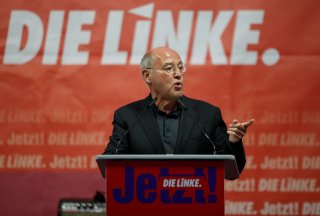Will (Ex?-)Communists Soon Be Part of Germany’s Governing Coalition?
Germany is holding a general election on September 26. The country’s three main left-wing parties could well secure a majority. Will the party that ruled East Germany until 1989 soon be back in power?
Large sections of the Social Democrats (SPD) and the left-wing environmental Greens are in favor of an alliance with the leftist Die Linke party. Moreover, the leaders of the SPD and the Greens have not explicitly ruled out a coalition with Die Linke, which would have an overall majority according to the latest polls.
Where does Die Linke come from and what does it stand for? It is the latest iteration of the former SED (Socialist Unity Party of Germany), which ruled the communist German Democratic Republic (GDR) until 1989. The party has changed its name several times since then, but it still adheres to its long-standing socialist goals. In fact, in many respects, it favors policies similar to those Die Linke pursued in the GDR when the party was still called the SED. This is evident from the party’s housing policy. Die Linke, for example, actively supports the campaign to expropriate rental apartments from large real estate corporations. In the German capital, Berlin, the party is currently backing a referendum that would expropriate anyone who owns more than three thousand rental apartments in the city. In addition, private apartment owners are to be forced to reduce existing contractual rents and would be banned from implementing future rent increases.
And it’s not only property owners who are to be targeted with expropriation. The party’s chairwoman Janine Wissler, whose role models for many years were (and perhaps still are) Leon Trotsky and Lenin has openly stated that “all services of general interest belong back in public hands and under public control.” In one interview, she cited private hospitals and nursing care companies, banks, public transportation and other sectors as examples. “These are the areas that come to mind first,” Wissler said.
In addition, the party’s program includes tax excesses that would in effect lead to expropriation. For instance, Die Linke wants:
A one-off wealth levy on net assets of more than two million euros (about $2.3 million), to be paid over a period of twenty years. The levy would start at 10 percent but then increase progressively the higher the value of the net assets. Die Linke is willing to reveal that the levy is to increase, but has not made clear up to what level.
A wealth tax on assets above €1 million (approx. $1.2 million). This would start at 1 percent, rising to 5 percent and be charged annually.
To raise the income tax rate to 60 percent on amounts above the current threshold of €260,533 (about $300,000) for high earners and to 75 percent on taxable incomes above €1 million.
Anyone who pays 75 percent income tax, plus an annual 5 percent levy on their assets, and then an additional wealth tax of indeterminate amount, is effectively expropriated. What entrepreneur would then choose to stay in Germany?
A left-wing politician at one of Die Linke’s “strategy congresses” caused great outrage when she spoke out in favor of “shooting the rich.” It was later claimed that she had been misinterpreted. And yet, Die Linke’s parliamentary manager in the German Bundestag posed just a few days ago with a bloodthirsty T-shirt bearing the slogan “Eat the Rich.”
Die Linke is also calling for Germany to quit NATO and for an end to all overseas military deployments. In terms of foreign policy, the party is primarily promoting a rapprochement with Russia. Among its other demands, the party wants to open Germany’s borders and implement an “immediate halt to deportations coupled with the introduction of the right to stay for all migrants.” In effect, this would mean that it would no longer be possible to deport even criminal migrants.
The SPD’s Chancellor candidate, Olaf Scholz, is considered a “moderate,” but he is backed by a number of far more radical forces. For example, the deputy chairman of the SPD, Kevin Kühnert, has become very influential. Two years ago, under his aegis, the SPD’s youth organization decided that “essential means of production” should be “socialized,” including land, large factories and the equipment they use, along with “all structures and systems serving the public interest,” large logistics facilities, and “capital assets that exceed a fixed limit.” Private renting of residential housing should only be allowed as an “absolute exception.” In interviews, Kühnert expressed the opinion that residential property should be reserved for owner-occupiers, not for renting. He also called for the nationalization of large German car companies such as BMW. So there is a great deal of overlap here with the ideas put forward by Die Linke.
Of course, should the three left-wing parties form a coalition after the elections on September 26, then this program will not be implemented precisely as outlined above. But one thing is certain: Germany will take a massive step on the road toward socialism should these three left-wing parties end up in power.
Rainer Zitelmann is the author of the book: The Power of Capitalism.
Image: Reuters

